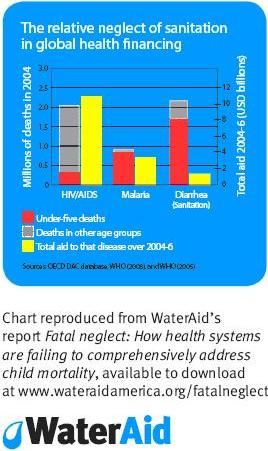
Two new reports out this week by WaterAid and PATH remind us what we have shamefully forgotten: diarrhea is the second biggest killer of children worldwide. This is a wake-up call because even those of us in the international development field have pretty much neglected the fact that diarrhea is still fatal in many parts of the world. It kills 1.6 million children each year.
The WaterAid report "Fatal Neglect" reveals that diarrhea prevention and treatment programs are woefully under-funded when compared to programs for HIV/AIDS and malaria. For example, HIV/AIDS receives over $10 billion a year in global health financing, while diarrhea receives well under $2 billion. These funding levels grossly misrepresent the disease burden as both these diseases are responsible for roughly the same death toll. However, the WaterAid report also makes very clear that adequately addressing diarrheal diseases should not come at the expense of funding needed for tackling other diseases.
The PATH report "Solutions to Defeat a Global Killer" highlights that during the 1980s and 1990s incredible progress was made through a variety of interventions in preventing and treating deaths from diarrheal dehydration but the momentum ceased when the issue fell off the radar in the 2000s.
The report states:
Extraordinary improvements were made in access to safe drinking water and sanitation. In total, development efforts during the International Drinking Water Supply and Sanitation Decade (1981 to 1990) and the following decade (1991 to 2000) provided water to more than 2 billion people and sanitation to more than 1.5 billion.
A 2008 research study conducted by PATH to evaluate the global health funding and policy landscape found that diarrheal disease ranked last among a list of other global health issues.
Fortunately, two recent initiatives in Congress give some hope that political attention is shifting back to diarrhea and other sicknesses that inadequate water and sanitation trigger.
New bipartisan legislation called "The Senator Paul Simon Water for the World Act of 2009"--if passed--would be one way to increase the financing to stop fatal diarrhea and to put progress back on track. The Act would commit the U.S. government to extending safe, affordable and sustainable supplies of water and sanitation to 100 million people by 2015.
This Act--building on earlier landmark legislation (The Senator Paul Simon Water for the Poor Act of 2005)--could ratchet up interventions such as building latrines, promoting handwashing with soap, constructing water wells and providing point of use water treatment, all of which reduce fatal diarrhea.
Another bipartisan Act, "The Global Child Survival Act of 2007" would also have an impact on eradicating fatal diarrhea if it were signed into law. Appropriations for this Act would fund both prevention (water and sanitation programs) and treatment (oral reyhdration therapy and zinc tablets).
Together these two pieces of legislation are an incredible opportunity for the U.S. government to take a leadership role in addressing the imbalance in priority and funding that the WaterAid and PATH reports uncover. A "Call to Action" that PATH organized has been signed so far by 80 groups from the health, corporate, environmental and water and sanitation sectors. They represent the breadth of support that is needed to push these two pieces of legislation through Congress and get them signed into law by President Obama.
If the U.S. government were to take the lead on tackling diarrheal diseases and other illness connected to unsafe water, inadequate sanitation and poor hygiene, it could shift global priorities on this issue and save millions of lives each year. Stay tuned.
